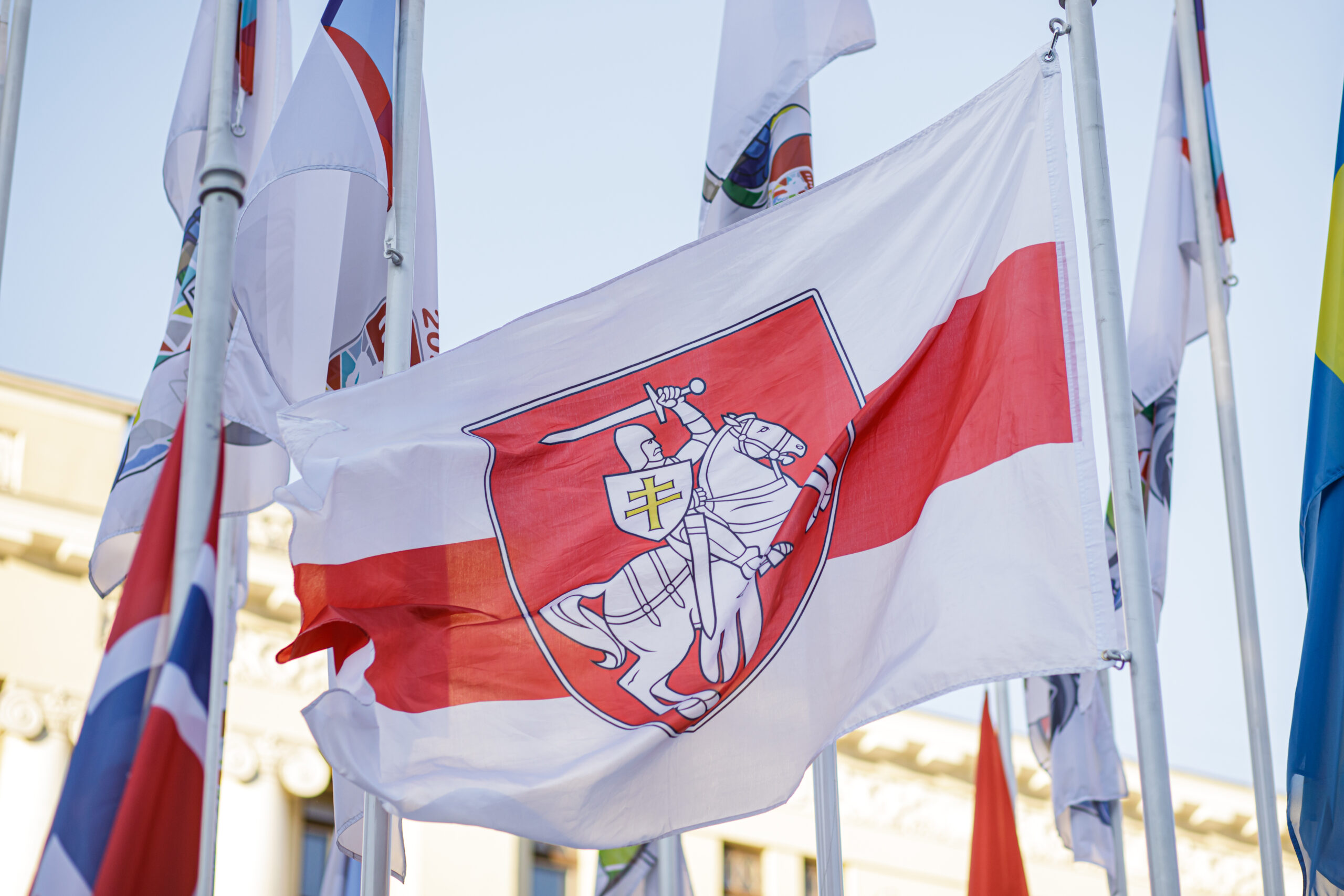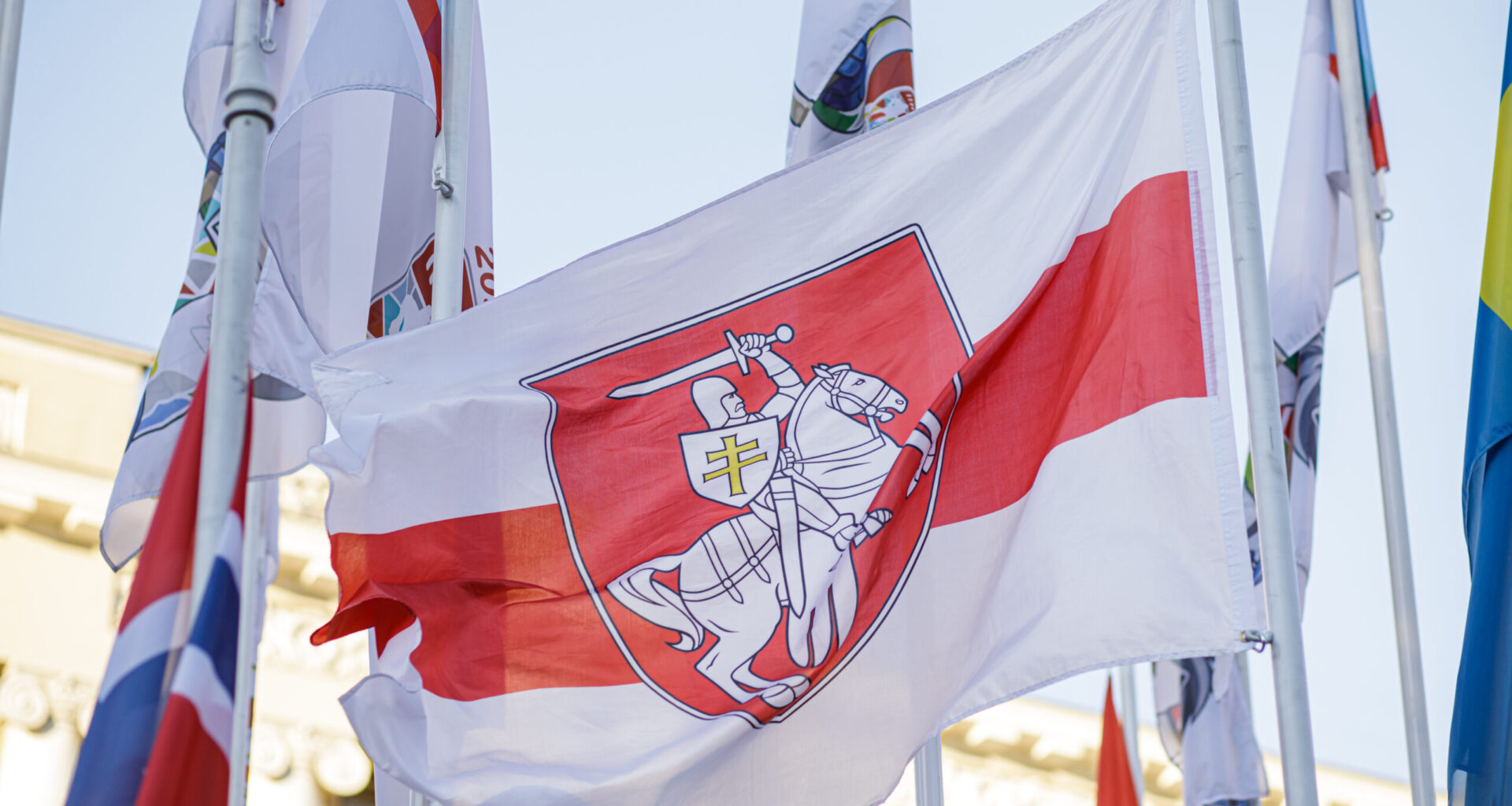The democratic opposition in Belarus experienced something of a rebirth during the presidential election five years ago. Today, following the most recent vote, activists remain determined to bring freedom to their country from the authorities in both Minsk and Moscow.
August 4, 2025 –
Mark Temnycky
–
Articles and Commentary

White-red-white flag used by the Belarusian democratic forces flying at the World Hockey Championships in May 2021. Photo: Girts Ragelis / Shutterstock
On January 26th 2025, Belarusian leader Alyaksandr Lukashenka forged the outcome of yet another Belarusian presidential election. According to the final polling numbers, the incumbent had won nearly 88 per cent of the vote. Russian President Vladimir Putin was quick to congratulate his counterpart, and he welcomed closer ties between their countries.
Lukashenka’s “convincing victory in the elections clearly testifies [his] high political authority and the undoubted support of the population for the state policy Belarus is pursuing,” Putin said in a statement issued by the Kremlin. Lukashenka is “always welcome and a dear guest on Russian soil,” he added. “As agreed, I look forward to seeing you soon in Moscow,” Putin concluded.
The declaration made by the Russian president is troubling. For decades, the Russian Federation has worked hard to help Lukashenka maintain his power in Belarus. Throughout Lukashenka’s thirty-year tenure, he has resorted to Russian-style political crackdowns. He has ordered the imprisonment of opposition members. In addition, he shut down several opposition political parties, and he consolidated several pro-government groups. Finally, many media outlets are controlled by the Belarusian government. These actions have helped him tighten his grip on the Belarusian state.
Outside of Lukashenka’s attempts to destroy democracy in Belarus, Russia has also helped the Belarusian dictator with his efforts. For example, during the 2020 presidential election, the Russians sent reporters from Russian state television to serve as anchors and producers on various Belarusian media outlets. In addition, Russia helped prop up the Belarusian economy by providing the Belarusians with several loans. Over the past several years, there has also been an increase in Belarusian reliance on “trade, energy, and finance”. Given the numerous international sanctions on Belarusian officials for their human rights violations and their unwillingness to promote fair and free elections, this has led the Belarusian government to establish greater relationships with Russia.
Despite Lukashenka’s best efforts, and Russia’s attempts to help the Belarusian dictator stay in power, these actions have fooled no one. While Putin congratulated Lukashenka for the presidential election results, the process was nothing more than a sham. In fact, the outcome was a complete farce.
For example, Lukashenka prevented several candidates from running in the vote. Furthermore, the Belarusian leader threatened to completely shut down the internet if protests occured. In addition, election observers from the Organization for Security and Co-operation in Europe were prevented from coming to Belarus to monitor polling stations. These actions highly suggest that the 2025 presidential election was anything but free and fair.
Several countries were also quick to condemn the results. For example, Australia, Canada, the European Union, New Zealand, and the United Kingdom issued a joint statement in response to the outcome of the 2025 Belarusian presidential election. The document read that “[n]o election can be considered free, fair or in line with international standards when it is held in a climate of ongoing repression, marked by a clampdown on civil society, arbitrary detentions, and restrictions on genuine political participation.” In addition, the UK and Canada imposed new sanctions on Belarusian officials to punish them for violating democratic rights. Similarly, the United Nations denounced the results, saying that the election in Belarus “cannot be free or fair in the country’s current repressive environment”.
Finally, the Belarusian democratic forces have vowed to fight on. After condemning the outcome of the 2025 Belarusian election, they have continued working together to bring about real change and democracy to Belarus.
In an interview with Euronews in March 2025, Sviatlana Tsikhanouskaya said that members of the movement and Belarusian citizens are “preparing to rise up when the time is right”. She also noted that while Lukashenka had forced everyone to go underground, this should not be interpreted as Belarusians giving up on change in their country. Instead, Tsikhanouskaya reaffirmed that the democratic movement is alive and well. She concluded that the movement and citizens will be “ready when there will be a possibility” to address regime change in Belarus.
There is truth to these statements. For example, Tsikhanouskaya and other members of the Belarusian democratic forces have continued to meet with EU elected officials and dignitaries. During these exchanges, they have discussed how they can strengthen democracy in Belarus. They have also spoken about how the EU can impose sanctions on Belarusian government officials to put pressure on Lukashenka and his cronies.
Aside from meeting with foreign dignitaries, the Belarusian democratic forces are active in other spaces. For example, they have published articles in several news outlets to inform the world about the situation in Belarus and how individuals can help the movement with their fight for democracy. They have spoken on television shows, newspapers, think tanks and podcasts. Members of the Belarusian democratic forces have urged western governments to put additional pressure on Lukashenka, and they have outlined policy recommendations on various courses of action. Furthermore, they have published reports on human rights abuses and violations in Belarus to educate readers about the brutality of the Lukashenka regime. Finally, many Belarusian activists are on social media, using these platforms to spread their message.
The democratic forces also recently earned a victory against the Lukashenka regime. In late June, several political prisoners, including Siarhei Tsikhanouski, were freed by the Belarusian government. While there are still more than one thousand Belarusians who are wrongfully imprisoned by Lukashenka, the event was a “moment of optimism that offered hope for the future” of Belarus. It has also provided momentum for the democratic movement.
In other words, the Belarusian democratic forces remain undeterred by the Lukashenka regime. They are not afraid to stand up for democratic rights and freedoms, and they will continue to do whatever it takes to ensure that their homeland has true peace, justice and freedom.
No one is certain when the Lukashenka regime will end. But with continued persistence and activism, the Belarusian democratic forces will succeed.
Mark Temnycky is a nonresident fellow at the Atlantic Council’s Eurasia Center and an accredited freelance journalist covering Eurasian affairs.
New Eastern Europe is a reader supported publication. Please support us and help us reach our goal of $10,000! We are nearly there. Donate by clicking on the button below.
